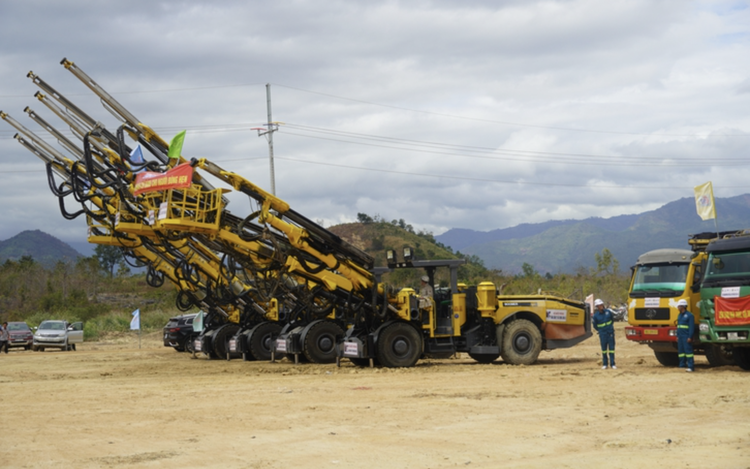
The Bac Ai hydroelectric power plant, located in the former Ninh Thuan Province, now part of Khanh Hoa Province in south-central Vietnam, is set to be fully operational in May 2031. Photo: Ngoc An / Tuoi Tre
Over more than three decades, not only has Vietnam changed a lot and developed, but the EU-Vietnam relations have grown into one of the broadest, deepest relationships, EU Ambassador to Vietnam Julien Guerrier told local reporters on Tuesday.
Vietnam and the EU have developed their relations based on many different pillars, with three main ones, he stressed.
“The first is trade and investment,” Guerrier stated.
The EU-Vietnam Free Trade Agreement (EVFTA) has helped increase trade flows between the EU and Vietnam by 40 percent to more than 65 billion euros (US$75 billion), making Vietnam the EU’s first trading partner in ASEAN and its 16th trading partner across the world.
Also, foreign investment from the EU in Vietnam has climbed from 22 billion euros ($25.4 billion) to 30 billion euros ($34.6 billion).
“The second pillar I wanted to mention is climate action,” he said.
Both the EU and Vietnam have committed to be climate neutral by 2050.
Through the Just Energy Transition Partnership, G7 members and the EU pledged to invest 15 billion euros ($17.3 billion) in renewable energy in Vietnam to help the country fulfil the commitment to moving away from coal electricity production and to developing a regulatory framework that will attract private investment in renewable energy.
Vietnam and the EU reaffirm their commitment to net zero and continue to work together in climate action.
“We have made great progress this year on several different flagship projects such as the Bac Ai hydroelectric power plant, the Tri An hydroelectric power plant, and the Tra Vinh wind farm on the sea in the Mekong Delta region,” Guerrier stated.
He also identified security and defense as the third pillar to foster the bilateral relationship.
Both Vietnam and the EU face an increasingly unstable and dangerous world, including tensions in the East Vietnam Sea.
“We both want to cooperate to support multilateralism, the respect of international law and the UN Charter, especially the UN Convention on the Law of the Sea (UNCLOS)," the diplomat said.
“It is important for us because 40 percent of our imports and 25 percent of our exports pass through the [East Vietnam Sea].
“So we have a direct interest, even though we are far away in Europe.
“I mentioned three very important pillars: trade, climate and security, but there are many more areas where we cooperate very deeply with Vietnam in the environmental field, circular economy, forest management, social development and people-to-people exchanges.
“Over the past 35 years, we have consistently supported the sustainable development of Vietnam on its path to become a developed economy by 2045.
“Vietnam is still the first beneficiary of European aid in the region and conversely the EU is the first provider of development aid to Vietnam."
He affirmed that the EU is one of the main partners of Vietnam on its path to sustainable development.
During the 35-year period, it has been a trustworthy, reliable, steady, stable partner for Vietnam, investing for the long-term development of Vietnam and it will continue to do so, he said.
Looking forward to comprehensive strategic partnership
“We have reached the milestone of 35 years, one of the deepest and broadest relations in the region," he stressed.
“We want to go one step beyond by having with Vietnam a comprehensive strategic partnership which will reinforce our cooperation in all areas."
Deeper cooperation in science and technology, innovation, semiconductors, raw materials, and many other fields will be important for the development of Vietnam in the coming years, he said.
However, he explained that to elevate the ties to a comprehensive strategic partnership, it is vital to negotiate and go deeply into each area.
“This will take a little bit of time,” he said.
For the elevation of the comprehensive and strategic partnership, it would be done on the occasion of a high-level visit between the EU and Vietnam that the two sides still have to schedule, he said.
Progress on IUU fishing compliance
Vietnam has completely overhauled its legislation for illegal, unreported, and unregulated (IUU) fishing activities, putting it on par with the world-class legislation in this area, Guerrier stated.
It has also invested a lot to equip all fishing boats beyond 15 meters with tracking devices.
Besides, the Ministry of Agriculture and Environment and the prime minister are coordinating the action of many coastal provinces to implement the IUU legislation by explaining the rules to fishermen, and sanctioning them when they are not following the rules.
“This is a complex matter that has to be done by all provinces,” he said.
He revealed that the EU is analyzing a report sent by the Ministry of Agriculture and Environment to Brussels in early October.
“We see considerable progress," the ambassador underlined.
“We still have a number of questions to address.
"Implementation on the ground and traceability are not easy things to deliver on. So this is not something we can do from one day to the next.
“However, we hope to continue the excellent cooperation with Vietnam in order to reach as soon as possible the stage where Vietnam would be considered as fully compliant and the EC's IUU fishing 'yellow card' warning could be liìted."


Max: 1500 characters
There are no comments yet. Be the first to comment.